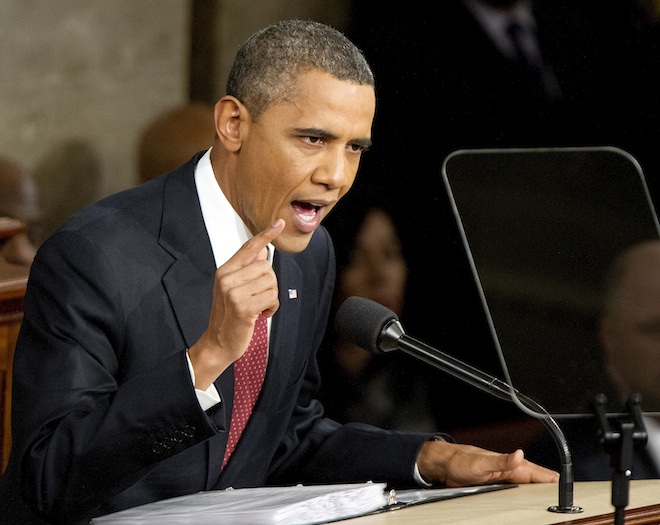President Obama’s fiscal year 2013 budget envisions the economy healing steadily after years of hemorrhaging and stagnation — and key government services surviving mostly despite the violence done to the federal ledger by the Bush tax cuts, the wars in Iraq and Afghanistan and the 2008 financial crisis.
It also shows federal deficits declining steadily over the coming decade, and the national debt stabilizing as a share of GDP over the same period.
These are the consequences of multiple, competing strategic ideas:
First, as a matter of economic policy, Obama has sought to stabilize and grow the economy in a way that has allowed annual deficits to remain at or above $1 trillion; his challenge now is to draw these down without severely damaging key support programs and federal investments — and the only way to do that is to combine scheduled and future spending cuts with higher tax revenues. Those revenues –$1.5 trillion over 10 years — would come largely from allowing the Bush tax cuts to expire for high income earners, limiting their itemized deductions, and from ending the tax breaks they receive on their investment dividends.
That’s where framing comes in. The budget is at pains to explain that many of the cuts Obama supports aren’t to wasteful or failed programs, but rather “valuable programs that we would not cut if not for the fiscal situation.”
It calls out Republicans nearly a dozen times for their adamant refusal to take a penny in new revenue from wealthy Americans, dooming recent administration efforts to reduce deficits or stimulate the economy with new spending.
In his budget message, Obama alludes to the GOP’s alternative vision: to use the mushrooming national debt as an excuse (or opportunity, if you’re so inclined) to phase out some of the most popular services the government provides while reducing taxes on wealthy Americans.
“I am proposing more than $360 billion in reforms to Medicare, Medicaid, and other health programs over 10 years. The goal of these reforms is to make these critical programs more effective and efficient, and help make sure our health care system rewards high-quality medicine,” Obama writes. “What it does not do–and what I will not support–are efforts to turn Medicare into a voucher or Medicaid into a block grant. Doing so would weaken both programs and break the promise that we have made to American seniors, people with disabilities, and low-income families–a promise I am committed to keeping.”
The contrast is key both to Obama’s election year pitch, and to the policy choice voters will face in November. That’s why the White House includes some rosy out-year predictions, and paints a picture of the current environment that’s bleaker than reality — a tactic, perhaps, to make developments in the months and weeks ahead appear healthier than they actually are.
It forecasts an average 2012 unemployment rate of 8.9 percent — significantly higher than it is right now. It predicts three percent GDP growth in 2013, despite the real threat of austerity budgeting in the coming years. And it imagines federal spending on Medicare and Medicaid holding steady through most of the coming decade.
Whether or not these are accurate or inaccurate assumptions, they’re marginal compared to the differences between this vision, and the GOP plan, which would slash federal spending dramatically, likely increasing unemployment; reduce taxes on the wealthiest Americans, and phase out Medicare and replace it with a subsidized private insurance system for seniors.
If Obama’s plan seems like a patchwork of ideas that he’s already presented to Congress, that’s because it is. But those ideas were carefully selected to achieve the twin goals of stabilizing the economic recovery and drawing a distinction between his own vision of the country and the GOP’s. It accomplishes the latter. Whether he gets his way on the former will be determined by voters in 2012.










